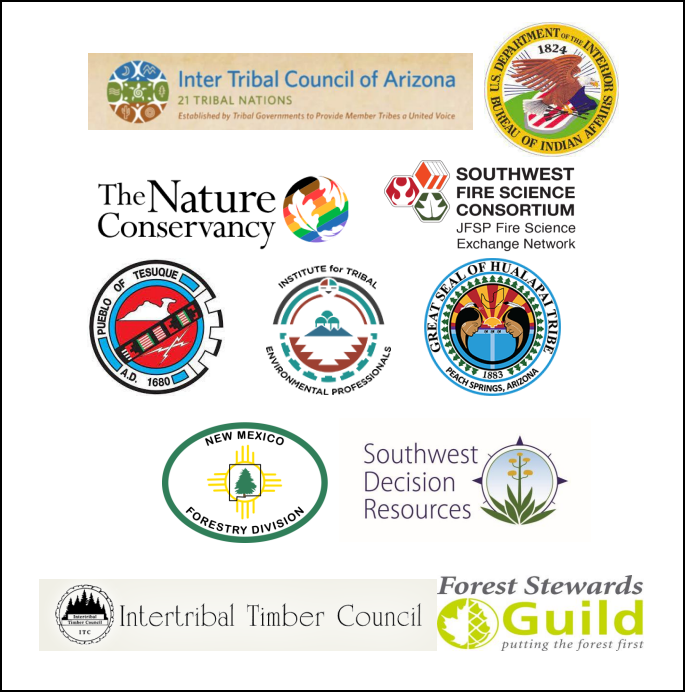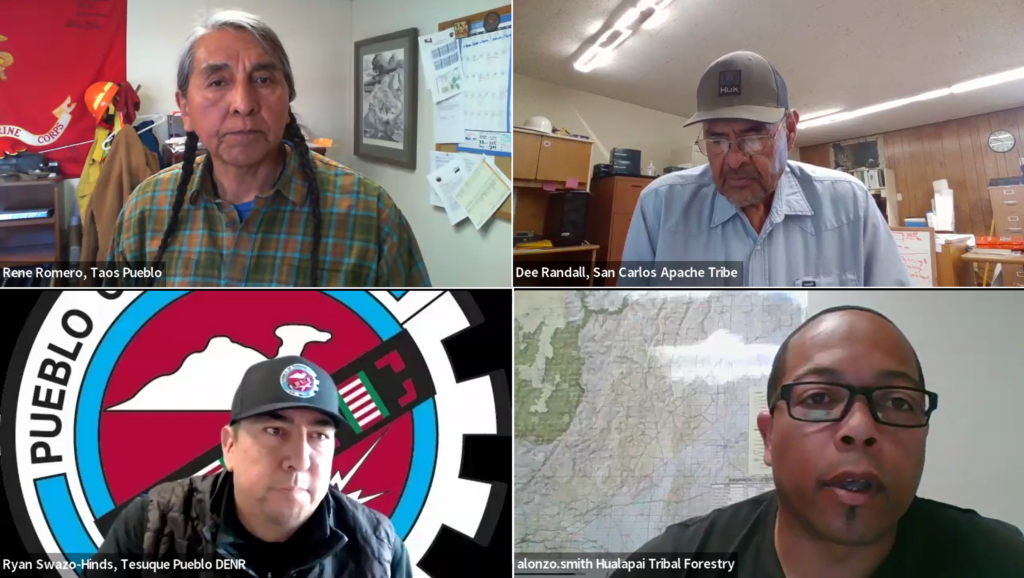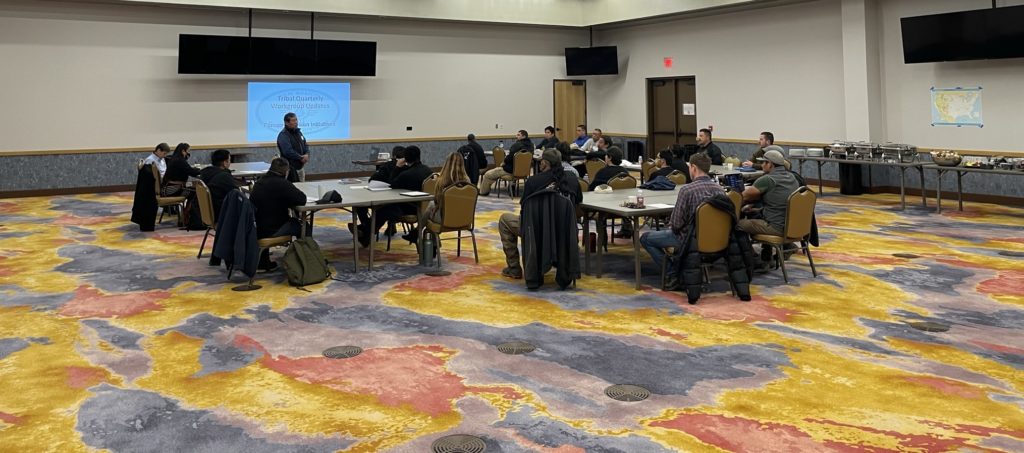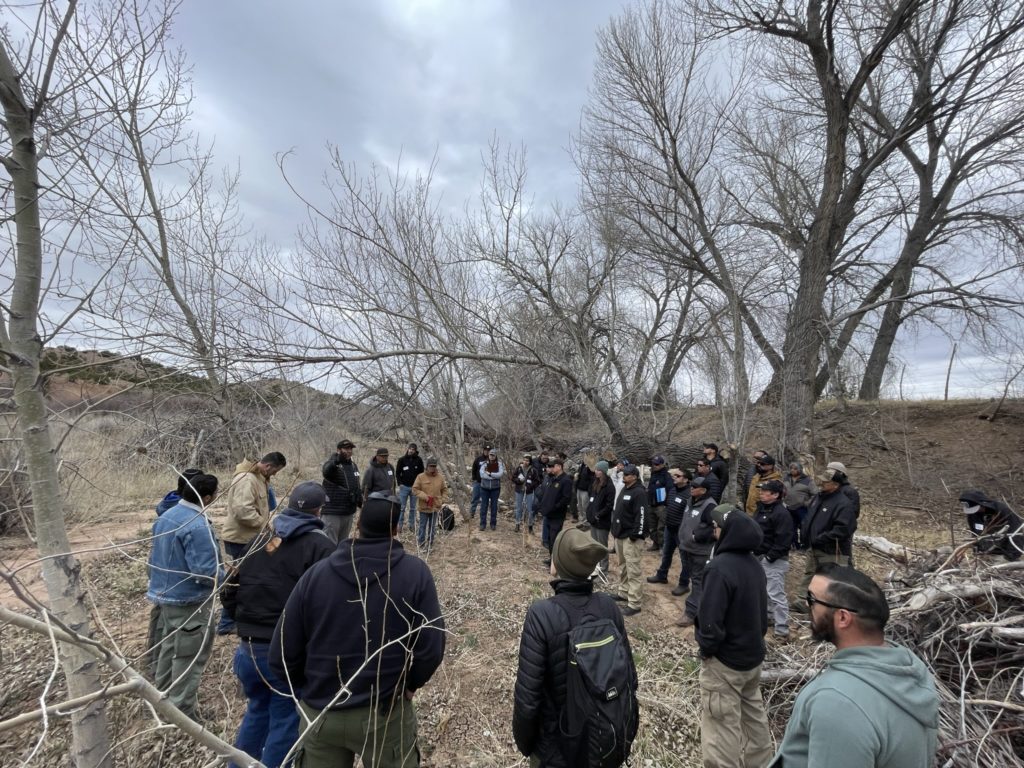Southwest Tribal Fire Climate Workshop
Written by Rachel Bean

As the climate in the southwestern United States grows warmer and drier, wildfires are likewise expanding in size and severity. Threats to wildlife, watersheds, water storage, cultural resources, communities, and more are increasing as a result. Given these changes to the known historic fire regime, land managers and stewards face new tribulations in their ecological restoration work. The exchange of knowledge is a necessary component in overcoming these challenges. It provides the space to craft creative solutions which improve and inform our collective approach to managing for landscape resiliency.
Recognizing that Indigenous communities have unique expertise and communal knowledge as well as unique resiliency needs, the Forest Stewards Guild, Southwest Fire Science Consortium, Inter Tribal Council of Arizona, and Institute for Tribal Environmental Professionals came together in spring 2023 to host an Indigenous-planned, -led, and -centered knowledge exchange workshop. This three-part SW Tribal Fire and Climate virtual series focused on increasing tribal capacity in New Mexico and Arizona to address wildland fire and the impacts of a changing environment.
 More than 100 participants from Tribal governments and organizations, federal and state agencies, universities, and research, planning, and other organizations attended the workshops. Over the course of three mornings, each staged two weeks apart, attendees listened to keynote presentations by Indigenous colleagues and broke into small groups to discuss topics such as climate adaptation planning and implementation, cultural and prescribed burning, the legacy of fire suppression on tribal lands, workforce development related to fire and natural resources, and the mechanics of mutually-beneficial collaboration and coordination.
More than 100 participants from Tribal governments and organizations, federal and state agencies, universities, and research, planning, and other organizations attended the workshops. Over the course of three mornings, each staged two weeks apart, attendees listened to keynote presentations by Indigenous colleagues and broke into small groups to discuss topics such as climate adaptation planning and implementation, cultural and prescribed burning, the legacy of fire suppression on tribal lands, workforce development related to fire and natural resources, and the mechanics of mutually-beneficial collaboration and coordination.
 In mid-March, just a few weeks after the SW workshop series, the Pueblo of Tesuque hosted an inaugural meeting of the New Mexico Tribal Fire Working Group, facilitated by the Forest Stewards Guild and The Nature Conservancy. This group came together to share experiences and leverage resources around pressing wildfire and prescribed fire issues – ecological challenges and change, capacity limitations, bureaucratic choke points, and more – which universally impact New Mexico tribes, pueblos, and Native nations.
In mid-March, just a few weeks after the SW workshop series, the Pueblo of Tesuque hosted an inaugural meeting of the New Mexico Tribal Fire Working Group, facilitated by the Forest Stewards Guild and The Nature Conservancy. This group came together to share experiences and leverage resources around pressing wildfire and prescribed fire issues – ecological challenges and change, capacity limitations, bureaucratic choke points, and more – which universally impact New Mexico tribes, pueblos, and Native nations.
After two days spent workshopping and visiting a riparian and upland resiliency project which uses fire as the primary restoration tool, the group made significant progress on their goals of brainstorming cooperative solutions and establishing a process for working together on shared challenges. The experience reaffirmed a desire to work across boundaries to care for communities and the land and to reinvigorate the use of fire, something which has been a keystone element of Indigenous land stewardship for millennia.

An overall theme is that these workshops and working groups represent only the first step in building Indigenous fire and climate capacity and resources. The Guild and other conveners of the 2023 Southwest Tribal Fire and Climate workshops are planning a 2024 series which will focus on training programs for fire use, empowering Native nations to enter into partnerships and agreements for cross-boundary work, and continual knowledge and culture exchange. The Guild, TNC, and others are also working to organize several Tribal Fire training days in the fall and a spring 2024 working group meeting. Both aim to establish a robust resource for Indigenous fire managers, planners, and practitioners in the Southwest by tackling challenges such as NWCG certifications, burn plan writing, and sharing inter-tribal fire resources. 
